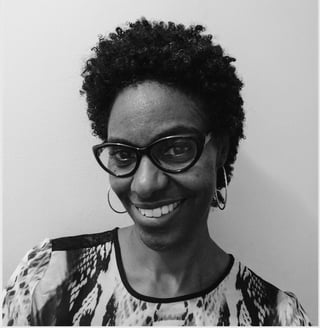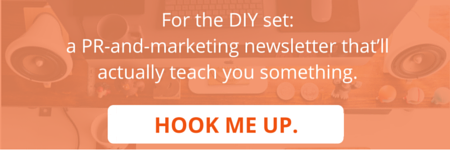You know that magic that happens when you work with awesome people? We think it’s everything, and we love working with folks who bring that kind of chemistry into our days. Periodically, we sit down with one of these execs to talk about startups, marketing, the future of their industries, world domination and whatever other topics pop up.
In the hot seat today:

Andrea Whittington is the marketing director at RRD, where she spearheads strategy, digital communications and account based marketing (ABM) for the global outsourcing department. Andrea previously worked at MetLife, Disney /ABC Radio and other companies, where she managed strategic communications, change management and business development to support sales and corporate initiatives. She earned a bachelor’s degree from the University of Pennsylvania and an MBA from Duke University.
- Who has influenced your career and how?
When I joined MetLife as the marketing manager for corporate procurement and supplier diversity, I was hired as a “change agent” of sorts. Ultimately, my job was to modify spending behavior for employees across the enterprise. At the time, it was a novel approach for a non-revenue generating division, but the premise was that you needed a dedicated strategic communicator to “market” the value proposition for employee-driven expense reduction.
It was an awesome amount of spend, and I’ll never forget that I was very concerned with all of the commodity categories – from pencils to computers and everything in between. My manager, the chief procurement officer, called me into his office and drew this chart that resembled a Nike-like swoosh. He reminded me that rather than focusing on all the smaller categories of spend at the narrow end of that swoosh, I should exclusively target the few “big fish” that could make the largest impact, helping us to achieve our mission more quickly.
It seems really basic now, but that illustration made me realize that I was trying to cover all these categories of spend, and if I instead focused on the top three, the results could be huge, undisputable and easy to share with senior management as a “win.” In short, my manager had just given me a roadmap to best position myself as a “corporate rockstar” and I am really grateful to this day for his advice.
Now I always ask myself, “What are the top three things I need to do to move this along?” Whether you’re focused on mechanizing processes at work or advancing your career goals, it’s easy to focus so much on the minutiae that you forget the big goal and the strategic steps to get there. Time is in short supply, so we all need to develop the confidence to consistently push forward our most strategic solutions – that is the way that you get things done. Not always easy, but highly effective and a habit we all have to learn one way or another.
- When and where did you start out, and how did that experience shape you?
I’ve always been a creative person, and I came from an artistic background where both my parents were self-employed. I wasn’t exactly sure what I wanted to do, but through research I determined that marketing was a viable career path to achieve stability in the “traditional” sense, while also utilizing my creative strengths, albeit within a corporate environment.
After I received my MBA from Duke, I was recruited by ABC Radio Network for a new management trainee program working directly for the president. I rotated through multiple training modules, including sales and business development. It was interesting and super challenging. Later, I worked at an interesting internet startup and then at MetLife, where I honed my skills navigating within a highly matrixed company with a long legacy of marketing and branding. In my current role, I’ve been able to work in a couple of divisions, including financial services and now strategic outsourcing.
Along the way, I’ve assembled a career that includes sales, business development, marketing communications and now digital strategy. It’s like a gumbo; I’m not shy about proposing solutions, thanks to my sales background, and the rest of my professional journey prepared me to think outside-the-box and to be comfortable talking to senior executives or secretaries, and numerous other stakeholders across a company to get a job done.
- What’s your main focus right now?
I’m really fascinated by where we are as marketers and consumers. People have the choice, the tools and the resources to investigate their own desires and interests – at all times. It sets up a creative challenge for B2B companies and consumer brands to get people to pay attention. For digital and content marketers, and communications professionals, this is about ideating at a rapid pace and getting people energized in real time.
My undergraduate degree is in psychology, so I’m really fascinated by how the digital ecosystem is building alliances between strangers. It’s a collapsing world. Facebook, LinkedIn and other platforms let us create affinity communities that are like cyber coffee shops. The playing field between big companies and smaller businesses is shrinking —all you need is an internet connection, some solid content and the appearance of being genuine in your messaging. A lot of companies are getting a real education in sincerity because of this. When everyone with a smartphone is a reporter, it’s transformational for society.
- When you think about the future of marketing, are you:
A. So, so excited
B. Cautiously optimistic
C. Kind of uneasy, TBH
Kind of uneasy. I see the need for businesses to constantly razzle dazzle, persuade and engage today’s audience. In some ways, it blurs the lines between what makes a company and how engaged brands should be with consumers. It’s Pandora’s Box. As we peel away the layers, it gets more confusing for companies to figure out where they need to be. Yes, audiences demand more of companies, but we’re not family. We have to ask, “What’s sincere, and what’s game theory?”
For example, doing socially infused campaigns whether B2B or B2C can be tricky. If marketers don’t understand the history behind why a certain activity or movement is being executed, they might want to stay away from those super-charged issues, in my opinion.
A critical goal of marketing is to influence how a prospect thinks of your brand and to ultimately motivate them to make a purchasing decision. That holds true for B2B companies selling multi-million-dollar workflow solutions and B2C companies selling candy bars.
The big question—what will that look like? How do you make a brand relevant to a prospect in a highly competitive environment with always-on access? It’s not an easy conversation, and the answers are changing minute by minute, to add another challenging variable.
- What keeps you up at night, and what gets you out of bed in the morning?
The most exciting part of my current role is that almost anything goes. I’m in a highly entrepreneurial role, and if I can articulate the value of what I want to do, I can usually get the green light to get it done. It’s like running a small business within a larger company, and that gets me out of bed in the morning.
On the flipside, one of the things that keeps me up at night is the question of executing projects based on available resources, whether human capital or technology driven. You can pull people in from other departments or hack together existing tech tools, but digital marketing is like a 500-headed dragon. For social and content marketing, the tap never turns off.
- Fill in the blank: the most important thing marketers need to remember about content marketing is…
We have to remember people’s evolving – or diminishing – attention spans. Nobody has time to read all that you want to say. We’re magpies. We want the shiny new object. This is something that I need to be aware of even as my business seeks to publish more thought leadership-based articles across social channels.
- If you weren’t working in marketing, what would you be doing?
I would likely have a couple of different jobs but probably something entrepreneurial within the creative arena.
- What’s at the top of your wish list for your industry?
I would like marketers and strategic communicators to be mindful of our programs and practices, and how they might be eroding humankind. Whether it be by having certain types of ads pop up at certain times, or how we reach out to audiences, share their information or cull our data, we should be more mindful of our long-term practices and what’s appropriate.
Subscribe to the Metis Communications newsletter for more marketing insights from industry experts.

